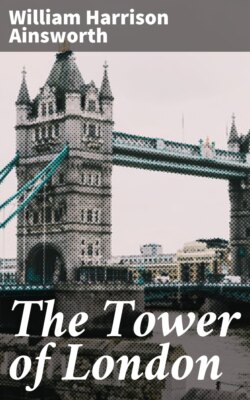Читать книгу The Tower of London - William Harrison Ainsworth - Страница 9
На сайте Литреса книга снята с продажи.
ОглавлениеHaving passed beneath the narrow arches of London Bridge, the houses on which were crowded with spectators, and the windows hung with arras and rich carpets, the royal barge drew up at the distance of a bow-shot from the Tower. Jane again drew aside the curtain, and when she beheld the sullen ramparts of the fortress over which arose its lofty citadel (the White Tower), with its weather-whitened walls relieved against the dusky sky, and looking like the spectre of departed greatness,—her firmness for an instant forsook her, and the tears involuntarily started to her eyes. But the feeling was transient; and more stirring emotions were quickly aroused by the deafening roar of ordnance which broke from the batteries, and which was instantly answered from the guns of several ships lying at anchor near them. By this time, the storm had in a great measure subsided; the thunder had become more distant, and the lightning only flashed at long intervals. Still, the sky had an ominous appearance, and the blue electric atmosphere in which the pageant was enveloped gave it a ghostly and unsubstantial look. Meanwhile, the lord mayor and his suite, the bishops, the privy council, the ambassadors, and the Dukes of Northumberland and Suffolk, having disembarked, the wafter having the charge of the royal galley drew it towards the land. Another “marvellous great shot,” as it is described, was then fired, and amid flourishes of trumpets, peals of ordnance, and ringing of bells, Jane landed. Here, however, as heretofore, she was coldly received by the citizens, who hovered around in boats,—and here, as if she was destined to receive her final warning, the last sullen peal of thunder marked the moment when she set her foot on the ground. The same preparations had been made for her landing as for her embarkation. Two lines of halberdiers were drawn up alongside the platform, and between them was laid a carpet similar to that previously used. Jane walked in the same state as before,—her train supported by her mother,—and attended on her right hand by her husband, behind whom came his esquire, the young and blooming Cuthbert Cholmondeley.
Where there are so many claimants for attention, it is impossible to particularize all; and we must plead this as an apology for not introducing this gallant at an earlier period. To repair the omission, it may now be stated that Cuthbert Cholmondeley was a younger branch of an old Cheshire family; that he was accounted a perfect model of manly beauty; and that he was attired upon the present occasion in a doublet of white satin slashed with blue, which displayed his slight but symmetrical figure to the greatest advantage.
Proceeding along the platform by the side of a low wall which guarded the southern moat, Jane passed under a narrow archway formed by a small embattled tower connected with an external range of walls facing Petty Wales. She next traversed part of the space between what was then called the Bulwark Gate and the Lion’s Gate, and which was filled with armed men, and passing through the postern, crossed a narrow stone bridge. This brought her to a strong portal, flanked with bastions and defended by a double portcullis, at that time designated the Middle Tower. Here Lord Clinton, Constable of the Tower, with the lieutenant, the gentleman porter, and a company of warders, advanced to meet her. By them she was conducted with much ceremony over another stone bridge, with a drawbridge in the centre, crossing the larger moat, to a second strong barbican, similarly defended and in all other respects resembling the first, denominated the Gate Tower. As she approached this portal, she beheld through its gothic arch a large assemblage, consisting of all the principal persons who had assisted at the previous ceremonial, drawn up to receive her. As soon as she emerged from the gateway with her retinue, the members of the council bent the knee before her. The Duke of Northumberland offered her the keys of the Tower, while the Marquess of Winchester, lord treasurer, tendered her the crown.
